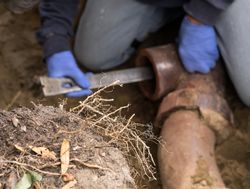3 Septic Problems Common in Older Homes

Old homes often come with inimitable charms like original moldings, glass doorknobs, wrap-around porches, and dozens of small details that give a home timeless elegance. However, with those charms can come a few complications, such as an aging septic system. If you’re interested in buying in an older home, get a septic inspection before finalizing the sale to see if it’s vulnerable to the follow septic problems.
What Septic Problems Affect Old Houses?
1. Full Septic Tank
Ask the realtor when the septic tank was last pumped. Typically, a tank should be pumped out every 3-5 years, but the schedule should be determined by the size of the household and septic tank. Your septic tank is built to be filled with solid waste, while gray water moves into the leach field. But when a tank hasn’t been emptied regularly, there’s nowhere for solids to go, leading to backups in your toilets and slow draining sinks and tubs.
2. Tree Roots
 Older properties often include beautiful, mature trees. Sadly, these might be a danger to the septic system. Tree roots can find their way into pipes, causing leaks that require expensive repairs. Even when roots are cut away, they can grow back unless treated with chemicals.
Older properties often include beautiful, mature trees. Sadly, these might be a danger to the septic system. Tree roots can find their way into pipes, causing leaks that require expensive repairs. Even when roots are cut away, they can grow back unless treated with chemicals.
3. Septic Tank Collapse
Older septic tanks were often made out of cinder blocks instead of the modern precast concrete, steel, or fiberglass. These older systems will slowly disintegrate over time. Wear and tear alone can cause issues like a cracked cover or even a collapsed tank, leading to costly repair and replacement. Find out when the home’s septic tank was installed and what it was made from.
If you’re considering purchasing an older home, contact the experts at ABC Cesspool & Septic Pumping in Kamuela, HI, to conduct a pre-purchase septic inspection. For over a decade, they’ve helped residential and commercial customers with septic system maintenance, including cesspool pumping, septic tank cleaning, raising covers to ground level. Call them at (808) 887-0766 or visit their website to learn more about your septic system today.
About the Business
Have a question? Ask the experts!
Send your question

